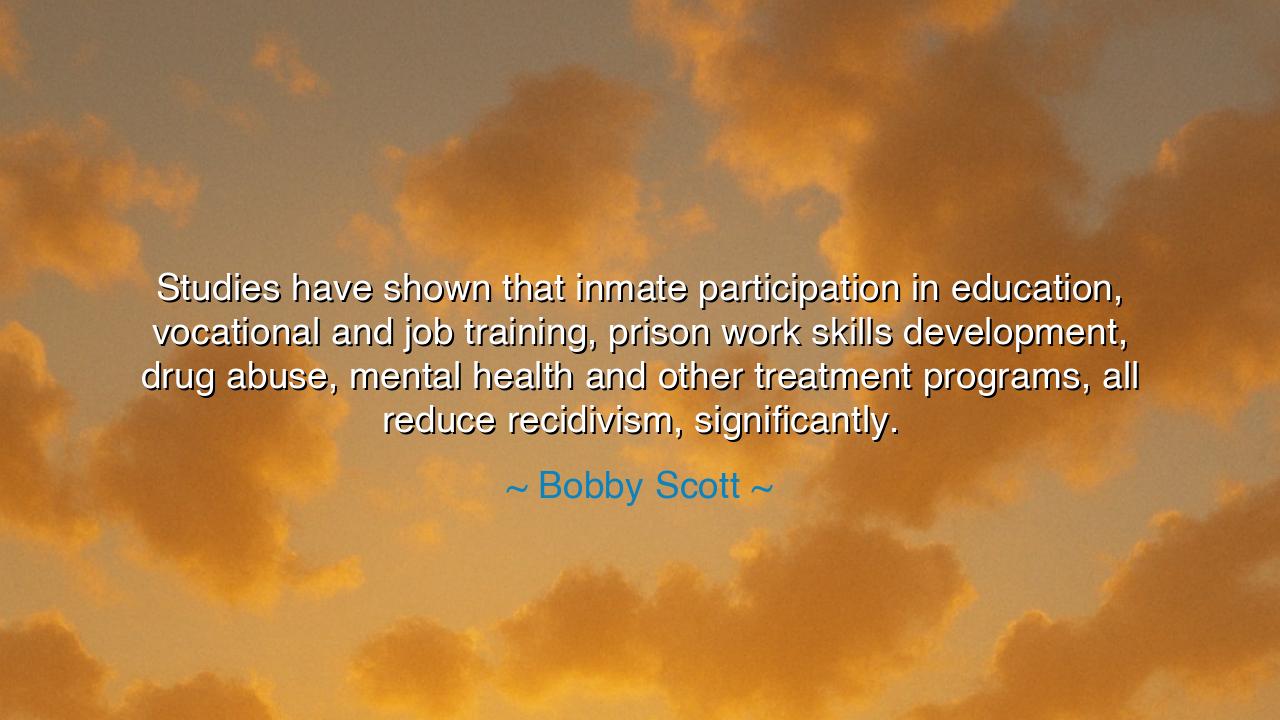
Studies have shown that inmate participation in education
Studies have shown that inmate participation in education, vocational and job training, prison work skills development, drug abuse, mental health and other treatment programs, all reduce recidivism, significantly.






In the words of Bobby Scott, there rings a truth both pragmatic and deeply humane: “Studies have shown that inmate participation in education, vocational and job training, prison work skills development, drug abuse, mental health and other treatment programs, all reduce recidivism, significantly.” At first, these words seem to belong to the realm of policy and reform, but in truth, they speak to one of the oldest and most sacred struggles of humankind — the struggle between punishment and redemption, between despair and renewal. It is a reminder that no soul is beyond restoration, that within even the darkest places of confinement, the light of transformation can still burn.
From the earliest civilizations, societies have wrestled with the question: how should justice be served? The ancients built their laws upon the pillars of order and retribution, but the wisest among them — from the philosophers of Greece to the sages of the East — understood that justice without mercy is barren, and punishment without purpose breeds only bitterness. In the spirit of that ancient wisdom, Bobby Scott’s words arise from modern evidence: that when we choose to educate rather than simply imprison, to heal rather than merely punish, we cultivate citizens, not repeat offenders. His message is not merely statistical; it is moral. It reminds us that true strength in a society lies not in its ability to destroy those who err, but to restore them.
Consider the story of Norway’s Halden Prison, often called the world’s most humane correctional facility. There, inmates live not in cells of cruelty, but in spaces designed for reflection, learning, and dignity. They are taught trades, given education, and offered therapy to confront the roots of their crimes. The result? A recidivism rate among the lowest in the world. This is not softness — it is wisdom. It echoes the same principle Bobby Scott speaks of: that crime is not cured by punishment alone, but by rehabilitation — by giving the fallen the tools to rise again. The harshest vengeance cannot create a just society, but one single act of renewal can ripple through generations.
The origin of Scott’s statement lies in his lifelong dedication to criminal justice reform. He has long championed the idea that rehabilitation and education are not luxuries, but necessities — not acts of generosity, but of survival. For a system that merely punishes breeds its own failure, cycling men and women through despair until they return, hardened and hopeless. But a system that teaches, heals, and equips plants the seeds of freedom even within walls of captivity. In this, Scott joins a chorus of voices throughout history who have dared to believe that every human being carries within them the potential for change.
We must remember that behind every statistic of recidivism lies a living soul — someone’s child, someone’s parent — who, given knowledge, purpose, and dignity, may yet rebuild a life of worth. Education is not merely the key to employment; it is the key to identity. It tells a man who has lost everything that he is still capable of creation. Vocational training does more than produce skill; it restores self-respect. Therapy and treatment reach into the silent wounds that no sentence can heal. These are not small mercies — they are the foundations of a just civilization.
From this wisdom, let us draw a lesson worthy of the ancients: compassion is not weakness, but foresight. To invest in the redemption of those who have erred is to invest in the peace of all. As the saying goes, “The society that builds more schools will need fewer prisons.” When we deny education and healing to those who have stumbled, we deny them the chance to rejoin the human story. But when we offer them tools of transformation, we affirm our belief that every person, no matter how fallen, can still rise.
And so, my listener, carry this teaching in your heart: to heal is greater than to condemn. Seek justice, yes — but let it be justice illuminated by mercy. Support systems that restore, not destroy. Speak for policies that teach and rehabilitate, not those that merely punish and forget. For when we rebuild a single life, we strengthen the very soul of our nation. As Bobby Scott reminds us, redemption is not an illusion; it is a path, narrow yet radiant, and every act of education, compassion, and care paves the way toward a future where even the broken can stand whole again.






AAdministratorAdministrator
Welcome, honored guests. Please leave a comment, we will respond soon